|
|
|
Sort Order |
|
|
|
Items / Page
|
|
|
|
|
|
|
| Srl | Item |
| 1 |
ID:
124581
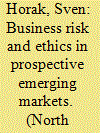

|
|
|
|
|
| Publication |
2013.
|
| Summary/Abstract |
urpose-This article discusses ethical issues of doing business with the Democratic People's Republic of Korea (North Korea) and associated risks in the area of sports sponsorship.
Design/methodology/approach-Ethical questions influence an international firm's engagement in North Korea in significant ways. Starting from a theoretical anchorage in business ethics, I apply descriptive case study methodology based on media analysis in order to understand ethical challenges of business management with North Korea by the example of firms from developed economies and emerging economies. This article is suitable to be used as a teaching case in international business and management classes (teaching notes are available on request from the author at sven.horak@gmx.de).
Findings-The study leads to three major propositions. International investors may benefit from first mover advantages in the area of sports sponsoring. On the contrary, breach of contract risks are high and a doubtful image of the sponsoring firm may be created in the eyes of the consumer while sponsoring a dictatorship. Moreover, the article finds indications that business transactions between two emerging markets appear to be smoother than between emerging markets and developed economies.
Originality/value-Only a few international firms are maintaining business relations with North Korea. If the new leadership opens up the country for international investors as proclaimed, international firms need to understand the prevailing business environment. In this context, the link between business ethics and associated risks has been rarely discussed since leadership change in 2011.
|
|
|
|
|
|
|
|
|
|
|
|
|
|
|
|
| 2 |
ID:
124587
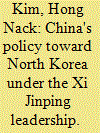

|
|
|
|
|
| Publication |
2013.
|
| Summary/Abstract |
Purpose-The purpose of this article is to examine China's policy toward North Korea under the Xi Jinping leadership from 2012 to the present.
Design/methodology/approach-It is designed to analyze China's changing attitudes and policy toward North Korea in the post-Kim Jong-Il era with emphasis on the analysis of the Xi Jinping leadership's policy toward the Kim Jong-Un regime. The approach is qualitative and expository, utilizing Chinese, Japanese, Korean and English source materials.
Findings-Unlike its predecessor, which regarded the prevention of the collapse of the North Korean regime as the top priority of China's Korea policy, the Xi Jinping leadership regards the preservation of peace and stability on the Korean Peninsula as the top priority of its Korea policy, for the outbreak of a war on the Korean Peninsula could seriously undermine China's security interest by embroiling it in an unwanted war. Unlike its predecessors, the Xi leadership is serious about the elimination of North Korea's nuclear weapons program.
Originality/value-The value of the article lies in its explanation for the change in the priority of China's policy from the survival of the North Korean regime to the preservation of peace and stability on the Korean Peninsula. In addition, it helps to explain why China under the Xi Jinping leadership has become not only more serious about opposing Pyongyang's nuclear weapons program but also more cooperative with the U.S. and other powers for the denuclearization of North Korea.
|
|
|
|
|
|
|
|
|
|
|
|
|
|
|
|
| 3 |
ID:
124588


|
|
|
|
|
| Publication |
2013.
|
| Summary/Abstract |
Purpose-The article discusses the effectiveness of economic sanctions against a nuclear North Korea in view of increasingly tougher sanctions imposed by the United Sates, its allies, and the United Nations.
Design/methodology/approach-The approach is qualitative and expository; it consults area studies, social science, and journalism; it observes recent, past, and current geopolitical events; and it makes informed policy suggestions.
Findings-United Nations economic sanctions against outlaw countries have usually generated tremendous costs for the target countries, but they have failed to change the political behavior of their leaders. Sanctions against North Korea have failed largely because not every country takes the North Korea sanctions as seriously as the United States, its allies, and the United Nations.
Originality/value-The value of the article lies in its explanation for the failure of economic sanctions against North Korea, the consequences of failure for sanctions against North Korea, and policy options on a nuclear North Korea.
|
|
|
|
|
|
|
|
|
|
|
|
|
|
|
|
| 4 |
ID:
124586


|
|
|
|
|
| Publication |
2013.
|
| Summary/Abstract |
Purpose-This paper will examine the implementation and impact of U.S.-led financial sanctions against North Korea, looking particularly at actions taken against Macau's Banco Delta Asia in 2005 and North Korea's Foreign Trade Bank more recently.
Design/methodology/approach-The study takes a qualitative approach to assess the recent history of the use of financial sanctions, drawing on U.S. government statements and documents, UN documents, and the secondary literature on North Korea and economic sanctions. It outlines the mechanisms of how financial sanctions function, and looks at the U.S. policy rationale behind their implementation.
Findings-Financial sanctions have played a key role in the U.S. response to North Korean proliferation and illicit activities, in part because they are one of a very limited number of ways that the U.S. can economically pressure North Korea. The U.S. may implement these sanctions more aggressively in the future, but such an approach may work against other policy imperatives.
Originality/value-There is a small but growing literature on financial sanctions, which are a relatively new but increasingly important policy tool for the U.S. This article contributes to this literature by giving an in-depth case study of the application of financial sanctions against North Korea.
|
|
|
|
|
|
|
|
|
|
|
|
|
|
|
|
| 5 |
ID:
124585
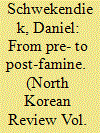

|
|
|
|
|
| Publication |
2013.
|
| Summary/Abstract |
Purpose-In the 1990s, North Korea experienced a national crisis that evolved into a famine. This paper explores the trends in underweight among preschool children measured from the pre- to the post-famine period.
Design-This research employs nutrition surveys carried out in North Korea in 1987, 1997, 1998, 2000, 2002, 2004, 2009 and 2012.
Findings-This paper shows that the country now has reached a pre-crisis level, indicating that children today are faring as well as they were during the Cold War. However, underweight rates are 24 times higher in North Korea compared to South Korea. More important, the UN targets an underweight rate of 9 percent in East Asia, but the rate is as high as 15 percent in North Korea, implying that further efforts are needed.
Originality-This paper provides rare evidence on the long-term trend in underweight among North Korean children. This is also the first paper that compares underweight rates of contemporary North Korean children with their South Korean peers.
|
|
|
|
|
|
|
|
|
|
|
|
|
|
|
|
| 6 |
ID:
124583
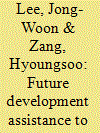

|
|
|
|
|
| Publication |
2013.
|
| Summary/Abstract |
Purpose-This article explores multilateral engagement in the economic rehabilitation of North Korea, with particular focus on the establishment of special trust funds.
Design/methodology/approach-The study consists of an analysis of international assistance to North Korea that addresses policy measures for improving the quality of aid delivery. Conceptual and empirical issues around multi-donor trust funds (MDTFs) are explored by conducting an examination of the role of aid coordination, management practices in multilateral aid, and the potential benefits of trust funds.
Findings-The setting up of trust funds is a possible option for resource mobilization and aid coordination in the provision of development assistance to North Korea. Given the potential benefits of such an aid modality, the creation of one or more MDTFs as a means of facilitating the denuclearization process on the Korean Peninsula could help strengthen relations between Pyongyang and the international donor community. In drawing attention to issues around the administrative structure of the MDTF, this article proposes that international donors establish a North Korea Development Assistance Group (NKDAG) as the principal trust fund governing body.
Originality/value-This is the first policy-oriented study detailing the possible establishment of MDTFs in the North Korean context. The suggestions of the article could contribute to efforts of the international community to improve the transparency and effectiveness of its aid contribution to North Korea.
|
|
|
|
|
|
|
|
|
|
|
|
|
|
|
|
| 7 |
ID:
124580


|
|
|
|
|
| Publication |
2013.
|
| Summary/Abstract |
Purpose-This article explores human rights and refugee status of the North Korean diaspora, with particular focus on the social construction of refugee rights.
Design/methodology/approach-The study analyzes the realities of the unstable status of the North Korean refugees in Asian and Western countries by focusing on the discrepancy between refugee rights and refugee status. Legal, political, diplomatic, and social issues around North Korean refugee status are examined by conducting an examination of the related countries' political discourses and actual policies.
Findings-North Korean escapees in Northeast and Southeast Asia have lived in hiding from forced repatriations by the PRC and neighboring countries, vulnerable to human rights violations. While North Koreans in South Korea have been granted legal citizenship, many North Korean asylum seekers staying in other countries have not been under legal or humanitarian protection. Although the concerned states are under pressure from the international community advocating universal human rights of North Koreans, they enforce refugee policies pursuing their own political and economic interests. Thus, the status of North Koreans is unstable and threatened when refugee rights are politically constructed by the concerned states' political and economic interests as well as by international relations.
|
|
|
|
|
|
|
|
|
|
|
|
|
|
|
|
| 8 |
ID:
124582
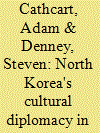

|
|
|
|
|
| Publication |
2013.
|
| Summary/Abstract |
Purpose-This article describes and analyzes the DPRK's cultural diplomacy during the early months of Kim Jong-un's reign.
Methodology-We analyze the recent practice of North Korea's cultural diplomacy, using two case studies: the KCNA-Associated Press photo exhibition in New York, and the tour of the Unhasu Orchestra to Paris.
Findings-Both initiatives coincided with the first months of Kim Jong-un's reign, and can provide an alternate perspective on both North Korean foreign policy and the wider debate about how to best engage the DPRK.
Originality/value-The article thus adds to the literature on North Korean foreign relations as well as cultural diplomacy more generally.
|
|
|
|
|
|
|
|
|
|
|
|
|
|
|
|
|
|
|
|
|